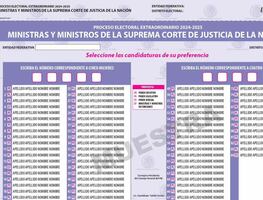Más Información

Anuncian cierre de oficinas de EU en México por funeral del expresidente Jimmy Carter; citas serán reprogramadas

Las noticias nacionales más consultadas de EL UNIVERSAL en 2024; Sheinbaum, “El Mayo” Zambada y Mpox

Alito Moreno urge a cambiar estrategia contra delincuencia; pide poner fin a tragedia de homicidios en gobiernos de Morena

SRE lamenta muerte de ministro Abel Escartín Molina; se desempeñaba en Embajada de México en Reino Unido
The Roman Catholic Church prefers burial over cremation and wants ashes of the dead to be kept in "sacred places", not at home, divided among family members or scattered to the wind, the Vatican said on Tuesday.
A two-page instruction issuing new rules on cremation also said that there were even some cases where a Christian funeral could be denied to those who request that ashes be scattered.
"The conservation of the ashes of the departed in a domestic residence is not permitted," the instruction from the Vatican's department on doctrine said, except in "grave and exceptional cases" to be decided by the local bishop.
For centuries, the Catholic Church prohibited cremation because it clashed with teachings about the resurrection of the body in the Last Judgment at the end of the world.
It started allowing cremation in 1963 but has always frowned on the practice.
"The Church insistently recommends that the bodies of the deceased be buried in cemeteries or other sacred places," because it showed the dignity and respect for the human body, said the document approved by Pope Francis.
If cremation is chosen, "the ashes of the faithful must be laid to rest in a sacred place, that is, in a cemetery or, in certain cases, in a church or an area which has been set aside for this purpose," it said.
"It is not permitted to scatter the ashes of the faithful departed in the air, on land, at sea or in some other way, nor may they be preserved in mementos, pieces of jewelry or other objects," the document said.
The Church could not permit or condone attitudes such as considering death as the "definitive annihilation of the person, or the moment of fusion with Mother Nature or the universe, or as a stage in the cycle of regeneration."
A Christian funeral could be denied if a person requests scattering of ashes as a means to mock the faith, the document added.






